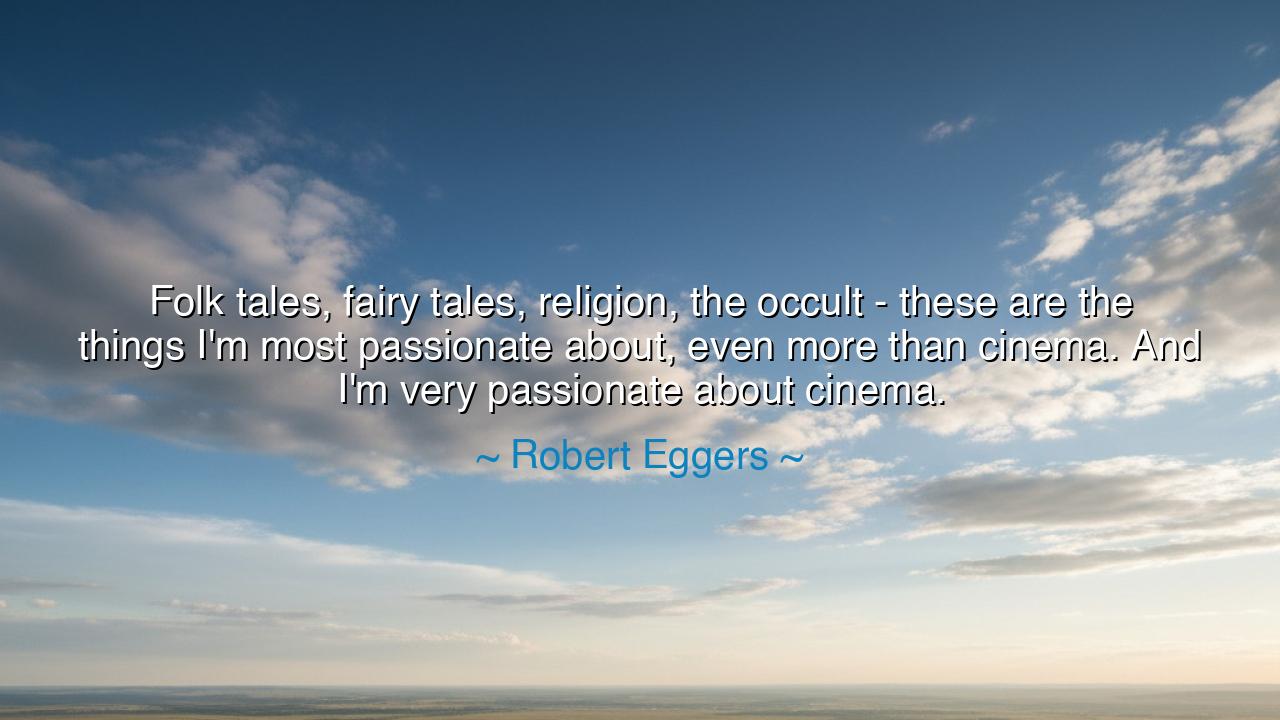
Folk tales, fairy tales, religion, the occult - these are the
Folk tales, fairy tales, religion, the occult - these are the things I'm most passionate about, even more than cinema. And I'm very passionate about cinema.






“Folk tales, fairy tales, religion, the occult — these are the things I'm most passionate about, even more than cinema. And I'm very passionate about cinema.” – Robert Eggers
In this declaration, Robert Eggers, the modern craftsman of myth and shadow, opens his heart to reveal the sources from which his art draws its power. His words are not merely about preference or inspiration — they are a confession of devotion, a recognition that beneath all art, beneath even the lens of cinema, lies the eternal wellspring of story, mystery, and belief. To say that he loves folk tales, fairy tales, religion, and the occult more than his chosen craft is to say that he honors the roots more than the branches — that art without myth is a body without a soul.
In the old days, before the age of the machine and the screen, humanity lived by the firelight of story. The folk tale was not mere entertainment; it was the memory of a people — a whisper of who they were, what they feared, and what they longed for. The fairy tale was the dream of the child’s heart, painting the invisible truths of courage, love, and darkness in images of kings and beasts. Religion sought the divine in the heavens, while the occult reached into the hidden mysteries of the earth. All four sprang from the same ancient soil: humanity’s desire to understand the unknown. Eggers, like a modern shaman, gathers these old fragments and breathes life into them again through his art.
The origin of his sentiment lies in his own creative journey. Born not into temples or castles but into the modern world of cinema, Eggers discovered that the greatest power of film is not in its technology, but in its ability to conjure — to summon the same awe, terror, and reverence that ancient stories once kindled in the hearts of their listeners. In his films, such as The Witch and The Northman, he does not invent — he invokes. His passion for folklore and spirituality transforms cinema into ritual. In his hands, the screen becomes the new fire around which humanity gathers to confront its fears and remember its forgotten gods.
Through this quote, Eggers reminds us that art is not born from novelty, but from continuity. The modern artist, he implies, must be like the bard or the priest of old — a keeper of memory, a translator of myth into the language of the living. Without myth, without the pulse of the mystical, creation becomes sterile. But with it, even the most fleeting image can awaken ancient emotions in the soul. Eggers’ reverence for these primal forces — folk tale, fairy tale, religion, and the occult — is not nostalgia, but recognition: that these stories are the bones of humanity, the original architecture of our imagination.
Consider the example of Carl Jung, the great psychologist who devoted his life to understanding the patterns of myth and symbol. He discovered that every human being carries within them what he called the collective unconscious — a vast ocean of archetypes born from the old tales of gods, heroes, and monsters. Jung understood what Eggers feels instinctively: that to explore these stories is to explore the hidden self. It is through myth that we confront our own darkness, and through symbol that we find redemption. Those who forget the old tales, Jung warned, lose their way in the labyrinth of their own minds.
Eggers’ words are therefore both personal and universal. They are the confession of an artist, but also the counsel of a sage. He calls us back to the roots of meaning — to remember that all art, faith, and philosophy are built upon the stories our ancestors whispered into the night. In a world that prizes logic and speed, he honors the slow, mysterious pulse of wonder. For him, cinema is the modern temple — but the myth is the god that dwells within it. Without that spirit, the images would flicker and fade, but with it, they burn eternal.
The lesson is this: never lose sight of the old stories. They are not relics — they are maps of the soul. Read the fairy tales again, not as children, but as seekers. Listen to the songs of your ancestors; walk among the myths of your people. Whether you find truth in the Bible, the Eddas, or the whispered legends of your homeland, remember that these are the waters from which all art and wisdom spring. The modern world may change its tools, but the human spirit still hungers for meaning, and meaning is always born from story.
So, as Robert Eggers teaches through his devotion, let your passion be rooted in the eternal. Create, believe, imagine — but do not forget the sacred fires that came before you. For the tales of old are not dead; they are sleeping. And every time you awaken them — in art, in prayer, or in dream — you remind the world that humanity is not a creature of machines, but of myth.






AAdministratorAdministrator
Welcome, honored guests. Please leave a comment, we will respond soon